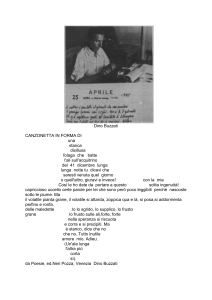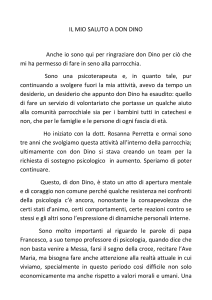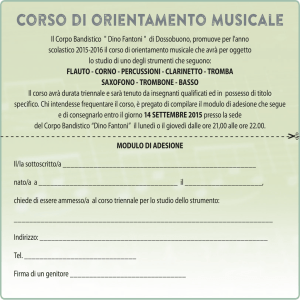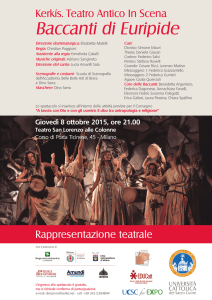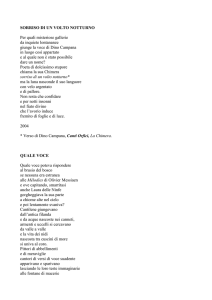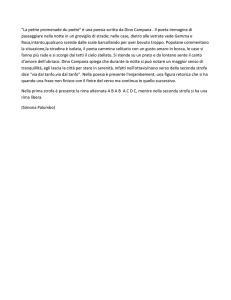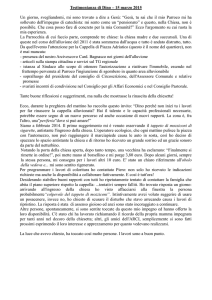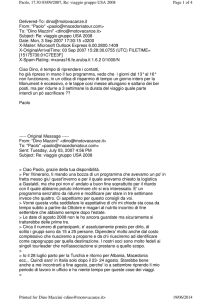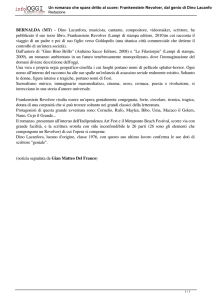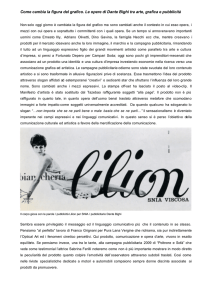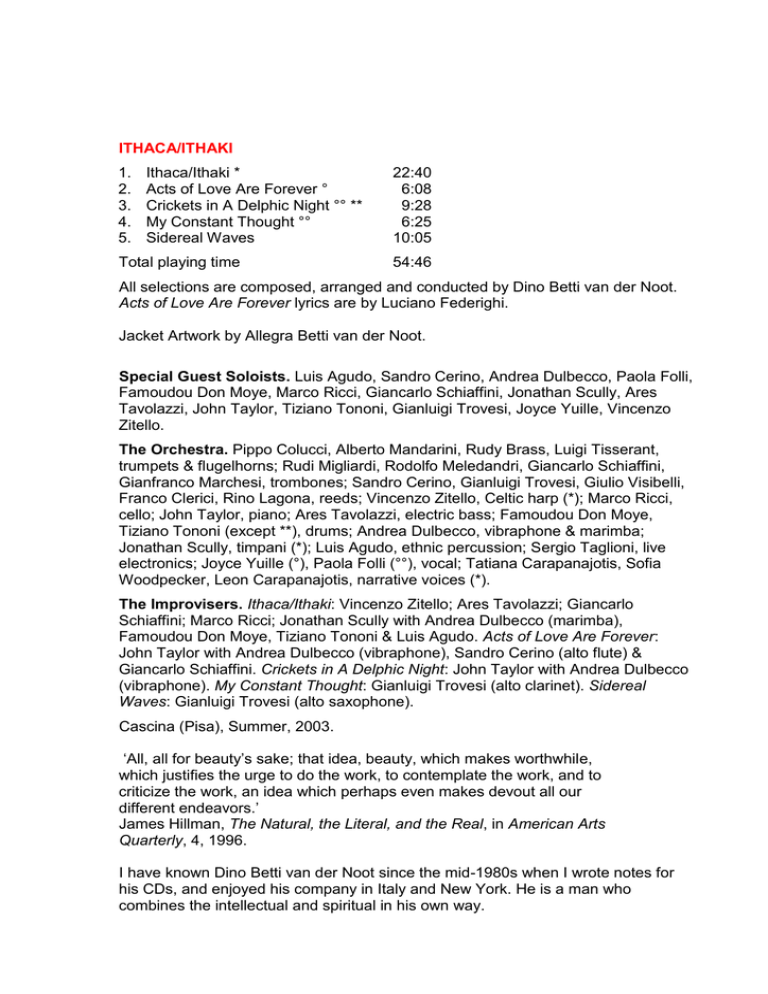
ITHACA/ITHAKI
1.
2.
3.
4.
5.
Ithaca/Ithaki *
Acts of Love Are Forever °
Crickets in A Delphic Night °° **
My Constant Thought °°
Sidereal Waves
Total playing time
22:40
6:08
9:28
6:25
10:05
54:46
All selections are composed, arranged and conducted by Dino Betti van der Noot.
Acts of Love Are Forever lyrics are by Luciano Federighi.
Jacket Artwork by Allegra Betti van der Noot.
Special Guest Soloists. Luis Agudo, Sandro Cerino, Andrea Dulbecco, Paola Folli,
Famoudou Don Moye, Marco Ricci, Giancarlo Schiaffini, Jonathan Scully, Ares
Tavolazzi, John Taylor, Tiziano Tononi, Gianluigi Trovesi, Joyce Yuille, Vincenzo
Zitello.
The Orchestra. Pippo Colucci, Alberto Mandarini, Rudy Brass, Luigi Tisserant,
trumpets & flugelhorns; Rudi Migliardi, Rodolfo Meledandri, Giancarlo Schiaffini,
Gianfranco Marchesi, trombones; Sandro Cerino, Gianluigi Trovesi, Giulio Visibelli,
Franco Clerici, Rino Lagona, reeds; Vincenzo Zitello, Celtic harp (*); Marco Ricci,
cello; John Taylor, piano; Ares Tavolazzi, electric bass; Famoudou Don Moye,
Tiziano Tononi (except **), drums; Andrea Dulbecco, vibraphone & marimba;
Jonathan Scully, timpani (*); Luis Agudo, ethnic percussion; Sergio Taglioni, live
electronics; Joyce Yuille (°), Paola Folli (°°), vocal; Tatiana Carapanajotis, Sofia
Woodpecker, Leon Carapanajotis, narrative voices (*).
The Improvisers. Ithaca/Ithaki: Vincenzo Zitello; Ares Tavolazzi; Giancarlo
Schiaffini; Marco Ricci; Jonathan Scully with Andrea Dulbecco (marimba),
Famoudou Don Moye, Tiziano Tononi & Luis Agudo. Acts of Love Are Forever:
John Taylor with Andrea Dulbecco (vibraphone), Sandro Cerino (alto flute) &
Giancarlo Schiaffini. Crickets in A Delphic Night: John Taylor with Andrea Dulbecco
(vibraphone). My Constant Thought: Gianluigi Trovesi (alto clarinet). Sidereal
Waves: Gianluigi Trovesi (alto saxophone).
Cascina (Pisa), Summer, 2003.
‗All, all for beauty‘s sake; that idea, beauty, which makes worthwhile,
which justifies the urge to do the work, to contemplate the work, and to
criticize the work, an idea which perhaps even makes devout all our
different endeavors.‘
James Hillman, The Natural, the Literal, and the Real, in American Arts
Quarterly, 4, 1996.
I have known Dino Betti van der Noot since the mid-1980s when I wrote notes for
his CDs, and enjoyed his company in Italy and New York. He is a man who
combines the intellectual and spiritual in his own way.
If you have been aware of Dino Betti‘s oeuvre you know that, beginning in 1985 he
began a string of annual recording projects. First was Here Comes Springtime,
followed by They Cannot Know, ‘86; A Chance For A Dance, ‘87-8; and Space
Blossoms, ‘89. It is not that these projects were whipped off in a trice. Each was
well-conceived, evolving from the composer‘s consciousness in an unforced
process, whenever his muse moved him. But then the flow stopped.
You must understand that Dino has long been concerned about new ways of
looking at the big band from a structural viewpoint and in varying its very sound; not
proceeding section by section but by using different trans-instrumental
combinations within the band.
He is not as concerned about the style as he is about conveying his emotion and
sharing it with the listener.
In an article, ―About Myself and Today‘s Music,‖ published in La Rivista del Museo
Teatrale alla Scala (summer 1992), Dino Betti wrote ―I have not composed anything
for more than three years. There are many reasons for this to happen, but perhaps
the most important one is given by my doubts about the way I could tell the stories
that are stored inside me. The result of this block situation is not only a sort of
frustration, provided by the unsatisfied need of communicating my experiences and
my emotions in a musical form. But it means, too, a critical review of my anomalous
position on the musical scene, and in-deep search about the triple composercomposition-audience relationship.‖
Dino goes on to cite ―exponential development of commercial music has further
fractured the consumers’ listening abilities, to the prejudice of poetry, of
metaphysics... On the other side, the audience now got used to follow the perverse
logic of musical categories (here‘s where I consider myself as anomalous, sort of a
maverick) to prepare themselves, with more or less discipline, to listen in different
ways.
―Personally, I trust the individual, his ability – and his personal choice – to express
himself out of schemes and systems.‖
The author of those words is certainly an individualist in thought and action who is
able to interact with a varied company in his recordings. ―After Space Blossoms I
wished to get rid of what I thought to be a stylistic prison,‖ he said to me in a letter
that accompanied the music contained on the disc you now hold. His dilemma in
thinking about a new work was the desire to do with aesthetics close to ―classical‖
contemporary music what he had done with a jazz big band. He envisioned a full
orchestra, complete with strings but, as he revealed, ―I had to cope with two
problems.
―I was filled with a jazz praxis and, furthermore, unable to make the strings sound
as I wished, or at least in a way somewhat different from what many contemporary
composers had already done in an innovative way.
―All of this gave me a blank-page syndrome that lasted several years. It seemed to
me impossible to get rid of it.‖
In early summer of 2002 the cloud began to lift. Dino wrote the theme of ―My
Constant Thought,‖ a melody that resonated in his musical heart. It spurred him on
to develop it into a composition exploring ―the different moods hidden behind the
melody and the chord changes.‖
It was finished by the end of July but shaking off his writer‘s rust had been
extremely tiring. It was also rewarding because Dino began to hear instrumental
voices he had used in the past: Sandro Cerino‘s bass flute and Gianluigi Trovesi‘s
alto clarinet. He also became aware that he had chosen to concentrate on timbre,
superimposing, in unison or octaves, instruments with different sound
characteristics. A breakthrough had occurred.
In September 2002 Dino started work on what became the title piece,
―Ithaca/Ithaki‖. I have sailed with him among the islands of the Ionian Sea and know
first-hand (although not as first mate) his connection to Ithaca.
At 22:50 ―Ithaca/Ithaki‖ is the most ambitious piece in this collection and a voyage
unto itself. Its genesis was in ―Ithaca,‖ a poem written in 1910 by Konstantinos
Kavafis (born in 1863, died in 1933, both on April 29 – how‘s that for symmetry?).
―The basic idea,‖ says Dino, ―that was in my mind for some years already, was to
create a symbolic musical journey, inspired by the poem.‖
For a thematic kernel which runs through the entire piece, there are three notes –
G-E-A – which are touchstone keys excepting a couple of excursions into G sharp.
Throughout there are contrasts in texture, rhythms, melodies and harmonies used
to introduce various episodes that give the piece a feeling of a voyage; an odyssey,
if you will, that fulfills the composer‘s intention.
As in the past he uses the human voice as an instrument but also to murmur
(members of the orchestra) at the beginning of ―Ithaca/Ithaki‖; to recite some verses
of Kavafis‘ poem (Tatiana Carapanajotis and Sofia Woodpecker as a quasi-Greek
chorus) right before the opening theme; and more recitation, this time through Leon
Carapanajotis‘ guttural sound, intoning lines from the Odyssey (translation: I just
arrived here with ship and mates, through the wine-coloured sea, sailing toward
foreign people) at the conclusion of this trip.
There is also Giancarlo Schiaffini‘s talking trombone that comes vaulting out of the
march-like funk that is introduced toward the end of the 14-minute mark. Other
instrumental voices stand out along the way: the Celtic harp of Vincenzo Zitello;
Ares Tavolazzi‘s bass; the manic cello of Marco Ricci; and the percussion
discussion among Don Moye, Tiziano Tononi, Andrea Dulbecco, Luis Agudo and
Jonathan Scully.
Dino knows the waters and lands of the Ionian, the culture and the mythology. I am
not completely surprised that he has been able to express his feelings about Ithaca
but I am nevertheless bowled over by the magnitude of what he has accomplished.
During the time he was working on ―Ithaca/Ithaki‖ Dino resurrected a theme from
Here Comes Springtime, his 1985 CD for Soul Note. Titled ―Eterni sono gli atti
d‘amore‖ and based on a short poem of Dino‘s and a theme he started working on,
according to the CD notes, ―almost thirty years ago‖ which would place it in the mid1950s. That one features alto saxophonist Donald Harrison, with and without cello
accompaniment, the trumpet of Rudi Brass and a wordless vocal by Linda Wesley.
This version of ―Acts of Love Are Forever,‖ finds Dino describing his words – ―It is
not important / a love to be forever. / Forever are acts / of love.” – as an ―almostpoem.‖ But here a magical lyric has been added by Luciano Federighi and sung by
Joyce Yuille, a voice Dino already had in mind as he was crafting the arrangement.
Between her two expositions Schiaffini‘s trombone, Cerino‘s alto flute, John Taylor‘s
piano and Andrea Dulbecco‘s vibes interrelate as soloists before Schiaffini goes for
himself.
We return to Greece with ―Crickets in A Delphic Night.‖ It was written immediately
after Dino had finished reimagining ―Acts of Love.‖ I don‘t know about you but I‘m in
a nocturnal pine grove where the tonal and modal mix and the crickets are the
polyrhythmic ostinato. Dulbecco‘s subtle vibes and Taylor‘s (as the English say
―absolutely wizard‖) piano create an atmosphere from the outset over a backdrop of
clarinets and continue to interact in improvised lines. The last segment belongs to
the natural beauty of Paola Folli‘s vocal, evolving out of the ensemble and
eventually melding back in, as she embodies the mysterious luminescence one
sometimes sees flashing in a forest at night and that of a gentle zephyr in the
branches overhead. Those are real crickets in the last few seconds. (Turn up your
volume.)
In the aforementioned ―My Constant Thought‖ Cerino‘s throaty bass flute inhabits
the theme as he brings Dino‘s love poem to life. Then the signal presence of
Trovesi enters in the lower region of his alto clarinet before soaring, growing more
passionate as the orchestra comes in underneath. Taylor and Ricci introduce Folli‘s
haunting voice over and inside the final ensemble.
The final piece Dino wrote for this disc is programmed last and it proves to be a
climactic finish. Dino comments, ―Since my childhood I have been fascinated by the
Gregorian Kyrie eleison from the Missa de angelis; I always had the feeling that it
was a music coming from very far away, both in time and space.‖
In recapturing some of the work‘s thematic fragments he has taken the solemnity
and grandeur of the ancient liturgical music to the stars and the planets and then
given it wings in a big band setting. ―The orchestra plays in a more traditional big
band way,‖ he says. ―During the recording one of the musicians called it sort of a
‗lay Kyrie eleison.‘
―While the theme is modal, the chord changes under the saxophone solo are tonal,‖
says Dino. ―The connection between one system and the other happens through a
number of short, interrupted phrases, sort of attempts to find the right way – also
through soul and gospel stylistic approaches.‖
As in many other portions of this CD the basic rhythms move between regular
pulses and more free formations by piano, bass and percussion. Overall, Dino has
also fulfilled his philosophy of balancing the written and the improvised.
Trovesi, certainly one of greatest and most versatile musicians in the world, plays
an inspired and inspirational alto saxophone solo that not only draws upon his love
of Eric Dolphy‘s vocabulary but also that of Charlie Parker‘s (something that makes
perfect sense to me even though I wasn‘t expecting it) in a totally Trovesian
manner. It is, indeed, a flight to the moon but not ―on gossamer wings,‖ rather eagle
feathers reinforced by titanium.
Two interludes, in which Taylor‘s piano is a texture, precede and follow Trovesi.
After the second interlude the original theme is reintroduced and shortly picked up
by the ensemble which builds to a crescendo that resonates in body and mind
before the last waves disappear as if in a vapor trail.
In light of the sea and space excursions in this set (―Ithaca/Ithaki‖ and ―Sidereal
Waves‖) an observation made about Dino‘s former compositions is relevant here:
―His expressive code is extremely personal – and he manages it in a game of
refined echoes and clever suggestions – that the listener has to perceive.
A construction where everything is well-balanced between passion and rationality in
search of a safe port that seems constantly close, but that you can reach only by
following the multiple traces that the composer leaves behind him.‖
Listening to any or all of these five compositions can be approached in various
ways. I prefer to let the music wash over me, sometimes sending my mind on
specific journeys but, more often, just absorbing feelings that don't need explication.
In breaking the ―blank-page‖ syndrome Dino has made the long wait worthwhile. For
no particular reason, I thought of the slogan that became synonymous with Paul
Masson in the United States: ―We serve no wine before its time.‖
I just hope that next time it will not be as long between vintages.
‘Dino Betti van der Notes’ by Ira Gitler (New York City, February 2005)
ITHACA (1910)
When you set off for Ithaca,
Pray for a long voyage,
fecund with adventure and experience.
Don‘t be afraid of the man-eating Laestrygones,
the one-eyed Cyclopes or Poseidon‘s fury;
it won‘t be these you meet
if your thoughts stay lofty
and a steely resolve steers your body and mind.
There will be no cannibals, no single-sighted giants,
not even the raging sea-god in your way
if you don‘t carry them within,
if your soul doesn‘t set them against you.
Pray for a long voyage,
for many summer mornings
when you arrive in a new port for the first time
and with pleasure touch firm earth;
browse through Phoenician markets and buy
ebony, amber, coral and mother of pearl,
fineries and perfumes of every kind;
indulge in as many intoxicating scents as you can
and stop in the ageless Egyptian cities
to glean wisdom from their sages.
And always keep Ithaca on your mind.
Because your arrival is your destiny.
But don‘t hurry the journey.
Make sure it lasts a long long time,
so you‘re old when you anchor on its shores,
rich with treasures collected on the way.
You didn‘t expect any treasures from Ithaca.
She will have given you this beautiful voyage.
Without her you would never have left.
What more then can you ask for?
And if you find her poor, she will not have lied.
You‘ll be wise then, full of experience — of life;
and you‘ll have understood the meaning of Ithaca.
Konstantinos Kavafis (Alexandria, April 29, 1863 - April 29, 1933)
English version by Stash Luczkiw
ACTS OF LOVE ARE FOREVER
Lyrics by Luciano Federighi
Evening sighs silent schemes
Doodles sand dunes on bare dreams.
We're both dust blown to gold
Gleaming on a dark no-man's land – split souls
Acts of love – talk in tongues
Where bound?
Forever – maybe more…
Heaven
Hell
Your touch burns
Flesh hollers with forgotten strains of joy and sad laughter
Am I dying?
Please
Blind love
Fly low and sing my heart high
Take your chance
Grace sorrow – swallow my hollows
And leave all senses blurred
Glad to be gliding – love – hiding – love – so
That world's shades won't be seen parading – we'll ride
Across a moonlit wonder – a private thunder –
Our bodies' garden
Where unknown gods perform everlasting acts of love…
No love can last forever…
However…
Each act of love forever wanders…
Glide – Love – Hide – Love…
Evening sighs silent schemes
Doodles sand dunes on bare dreams
We're both dust blown to gold
Gleaming on a dark no-man's land – split souls
Acts of love – talk in tongues
Where bound?
Forever – maybe more
Wanderin'
Through time…
―Tutto, tutto per la bellezza; quell‘idea, la bellezza, che fa sì che valga la pena, che
giustifica l‘impulso a realizzare l‘opera, a contemplarla, a criticarla, un‘idea che
forse rende perfino religiosi tutti i nostri differenti tentativi.‖
James Hillman, Politica della bellezza, Moretti & Vitali, 1999.
Conosco Dino Betti van der Noot dalla metà degli anni ‘80, quando ho scritto le note
di copertina per alcuni suoi CD, e apprezzato la sua compagnia in Italia e a New
York. È una persona che combina intellettualismo e spiritualità in un suo modo
originale.
A cominciare dal 1985, Dino ha realizzato una serie di progetti discografici a
cadenza annuale. Per primo Here Comes Springtime, seguito da They Cannot
Know, ‘86; A Chance For A Dance, ‘87-88; e Space Blossoms, ‘89. Non erano
certo progetti affrettati. Ognuno, ben concepito, evolveva dalla consapevolezza del
compositore attraverso un processo creativo estremamente libero, ogni volta che la
sua musa lo metteva in moto. Ma poi questo fluire si è arrestato.
Bisogna ricordare che Dino si è a lungo interessato a nuovi modi di concepire la big
band jazzistica, sia da un punto di vista della struttura musicale sia modificando il
suo specifico sound; non procedendo, ad esempio, per sezioni, ma utilizzando
differenti combinazioni trans-strumentali all‘interno dell‘orchestra.
Non si è mai preoccupato della propria aderenza ad uno specifico stile quanto della
possibilità di trasmettere le sue emozioni e condividerle con l‘ascoltatore.
In un articolo, ―Di me e della musica oggi,‖ pubblicato sulla Rivista del Museo
Teatrale della Scala (estate 1992), Dino Betti scriveva ―non compongo da oltre tre
anni. I motivi sono molti, ma forse il più importante è un‘incertezza sul come
raccontare le storie che ho dentro. Il risultato di questa situazione di blocco non è
soltanto una sorta di frustrazione, legata al bisogno non soddisfatto di trasmettere
agli altri, sotto forma di note, le mie esperienze e le mie emozioni. Ma anche un
certo riesame critico della mia posizione anomala nel mondo della musica, e la
ricerca di alcuni motivi che caratterizzano il triplice rapporto compositorecomposizione-fruitore.‖
Dino prosegue citando ―lo sviluppo esponenziale della musica commerciale‖ che
―ha creato un‘ulteriore frattura nelle capacità di ascolto dei consumatori, a danno
del poetico, del metafisico… D‘altra parte, il pubblico è ormai abituato a seguire la
logica perversa delle categorie musicali (ecco dove mi considero anomalo, una
sorta di maverick) per disporsi, più o meno disciplinatamente, all‘ascolto in maniera
differenziata.
―Personalmente, credo nell‘individuo, nella sua capacità, e nella sua scelta, di
esprimersi al di fuori degli schemi e dei sistemi.‖
Chi ha scritto queste parole è sicuramente un individualista nel pensiero e
nell‘azione, che, nell‘esecuzione delle sue composizioni, sa interagire con una
ampia varietà di musicisti. ―Dopo Space Blossoms avrei voluto uscire da quella
che mi sembrava una prigione stilistica,‖ mi ha scritto in una lettera che
accompagnava la musica contenuta nel disco che in questo momento avete in
mano. Il suo dilemma, nel pensare ad un nuovo lavoro, stava nel desiderio di
compiere, con un‘estetica vicina alla musica ―classica‖ contemporanea, quello che
in precedenza aveva fatto con la big band jazzistica. Pensava ad un‘orchestra
completa di archi, ma, confessa, ―mi scontravo con due problemi.
―Ero imbevuto di prassi jazzistica e, oltretutto, incapace di far suonare gli archi
come avrei desiderato, o almeno in maniera un po‘ diversa da come era già stato
fatto, innovativamente, da tanti compositori contemporanei.
―Tutto questo mi ha regalato una sindrome del foglio bianco durata anni: sembrava
non ci fossero vie d‘uscita.‖
All‘inizio dell‘estate 2002 la nube ha cominciato a dissolversi. Dino scrive il tema di
―My Constant Thought,‖ una linea melodica che risuonava dentro di lui. E si sente
spinto a svilupparla in una composizione che esplori ―i differenti stati d‘animo
nascosti dietro la melodia e il giro armonico.‖
La composizione è terminata alla fine di luglio, ma eliminare la ruggine accumulata
dal compositore è stato estremamente faticoso. È stato però anche gratificante
perché Dino ha ricominciato a sentire delle voci musicali che aveva utilizzto in
passato: il flauto basso di Sandro Cerino e il clarinetto contralto di Gianluigi Trovesi.
Si è inoltre reso conto di aver scelto di concentrarsi sempre più su una ricerca
timbrica, sovrapponendo, all‘unisono o all‘ottava, strumenti con diverse
caratteristiche sonore. Era avvenuta una svolta.
Nel settembre 2002 Dino ha iniziato a lavorare sul brano che dà il titolo a queso
album, ―Ithaca/Ithaki‖. Ho navigato con lui fra le isole del mar Ionio e conosco di
prima mano i suoi legami con Itaca.
Con i suoi quasi ventitre minuti, ―Ithaca/Ithaki‖ è la più estesa composizione di
questa raccolta e un lungo viaggio per mare in se stessa. La sua genesi va cercata
in ―Itaca,‖ una poesia scritta nel 1910 da Konstantinos Kavafis (nato nel 1863,
morto nel 1933, in entrambi i casi il 29 aprile – strana simmetria). ―L‘idea di base,‖
dice Dino, ―che covavo già da qualche anno, era la creazione di un viaggio
musicale simbolico, ispirato a quella poesia.‖
Come nucleo tematico che percorre tutto il brano, ci sono tre note – Sol-Mi-La – che
sono anche le tonalità base, con l‘eccezione di un paio di escursioni in Sol diesis.
Dal principio alla fine ci sono contrasti di struttura, ritmi, melodie e armonie utilizzati
per introdurre vari episodi che danno al brano il senso di un‘avventurosa traversata;
un‘odissea, se volete, che risponde alle intenzioni del compositore.
Come in passato, utilizza la voce umana come uno strumento, ma anche per
mormorare (gli stessi componenti dell‘orchestra) all‘inizio di ―Ithaca/Ithaki‖; per
recitare qualche verso della poesia di Kavafis (Tatiana Carapanajotis e Sofia
Woodpecker quasi come un coro greco) subito prima del tema d‘apertura; e ancora
una recitazione, questa volta con il timbro gutturale di Leon Carapanajotis, che
intona un paio di versi dell‘Odissea (traduzione: Sono testé qui arrivato, con nave e
compagni, attraverso il mare color del vino, navigando verso genti straniere) alla
conclusione di questo viaggio.
C‘è anche il trombone espressivo di Giancarlo Schiaffini che volteggia sopra un
funk – quasi una marcia – che si presenta intorno alla fine del quattordicesimo
minuto. E altre voci strumentali emergono lungo il percorso: l‘arpa celtica di
Vincenzo Zitello; il basso di Ares Tavolazzi; il cello aggressivo di Marco Ricci; e la
―percussion discussion‖ fra Don Moye, Tiziano Tononi, Andrea Dulbecco, Luis
Agudo e Jonathan Scully.
Dino conosce le acque e le terre dello Ionio, la cultura e la mitologia. Non sono
affatto sorpreso che sia stato capace di esprimere le sue emozioni nei confronti di
Itaca, ma sono tuttavia fortemente colpito dall‘importanza di ciò che ha realizzato.
Mentre stava lavorando ad ―Ithaca/Ithaki‖ Dino ha ripreso una composizione da
Here Comes Springtime, il suo CD Soul Note del 1985. Intitolata ―Eterni sono gli
atti d‘amore‖ e basata su una sua breve poesia ed un tema sul quale aveva
cominciato a lavorare ―almeno trent‘anni fa‖ (il che lo farebbe risalire alla seconda
metà degli anni ‘50). Allora presentava il sax alto di Donald Harrison, con e senza
l‘accompagnamento di violoncello, la tromba di Rudi Brass ed un vocalizzo di Linda
Wesley.
Questa versione di ―Acts of Love Are Forever,‖ è legata al concetto di una ―quasipoesia‖ (così la definisce Dino): ―Non è importante / che un amore sia eterno. /
Eterni sono gli atti / d‘amore.‖ E si vale di un testo pieno di sensuale poesia, scritto
da Luciano Federighi e cantato da Joyce Yuille, una voce che Dino aveva già in
mente mentre lavorava all‘arrangiamento. Fra le due esposizioni di Joyce, il
trombone di Schiaffini, il flauto contralto di Cerino, il piano di John Taylor e il
vibrafono di Andrea Dulbecco interagiscono come solisti, prima che Schiaffini
prosegua da solo.
Ritorniamo in Grecia con ―Crickets in A Delphic Night.‖ È stato scritto
immediatamente dopo che Dino aveva terminato la nuova versione di ―Acts of
Love.‖ Non so voi, ma a me sembra di essere in una pineta notturna dove il mix
tonale e modale e i grilli sono un ostinato poliritmico. Il raffinato vibrafono di
Dulbecco e il piano di Taylor (gli inglesi lo definirebbero ―assolutamente magico‖)
creano l‘atmosfera fin dall‘inizio sopra un tappeto di clarinetti e continuano poi ad
interagire nell‘improvvisazione. L‘ultimo segmento è dominato dalla naturale
bellezza vocale di Paola Folli, che si sprigiona dall‘insieme orchestrale e, alla fine,
vi si fonde, evocando la misteriosa luminescenza che a volte vediamo brillare di
notte in una foresta, mentre uno zefiro gentile soffia fra i rami al di sopra di noi.
Negli ultimi secondi ritornano i grilli (veri grilli: alzate il volume).
In ―My Constant Thought,‖ citato in precedenza, il gutturale flauto basso di Cerino
espone il tema, dando vita a questa composizione delicatamente erotica. Quindi
irrompe Trovesi, una presenza importante, partendo dal registro più grave del suo
clarinetto contralto prima di spiccare il volo, espandendosi sempre più veemente,
mentre l‘orchestra lo sostiene. Taylor e Ricci introducono la voce affascinante di
Paola Folli, sopra e all‘interno dell‘insieme finale.
L‘ultimo brano che Dino ha scritto per questo disco ne è anche il brano conclusivo e
ne rappresenta l‘esplosione finale. Dino commenta, ―fino dalla mia infanzia sono
stato affascinato dal Kyrie eleison gregoriano della Missa de angelis; ho sempre
avuto l‘impressione che fosse una musica venuta da molto lontano, sia nel tempo
sia nello spazio‖.
Riprendendo alcuni frammenti tematici dell‘inno, ha catturato la solennità e la
grandiosità siderale dell‘antica musica liturgica, dandole quindi nuove ali nel
contesto di una big band jazzistica. ―L‘orchestra suona qui in maniera più
tradizionalmente ‗big band‘,‖ dice. ―Durante la registrazione un musicista ha definito
questo brano una sorta di ‗Kyrie eleison laico‘,‖
―Mentre il tema è modale, il giro armonico sotto il solo del sassofono è tonale,‖ dice
Dino. ―Il passaggio da un sistema all‘altro avviene attraverso una serie di brevi frasi
interrotte, quasi tentativi di trovare la strada giusta – anche attraverso stilemi propri
del soul e del gospel .‖
Come in molte altre parti di questo CD, la ritmica alterna una pulsazione regolare a
più libere figurazioni di piano, basso e percussione. Dovunque, Dino è anche stato
fedele alla sua filosofia di equilibrare lo scritto e l‘improvvisato.
Trovesi, certamente uno dei più grandi e versatili musicisti nel mondo, prende, al
sax alto, un solo ispirato e ispiratore, che non solo attinge dal suo amore per il
vocabolario di Eric Dolphy, ma anche da quello di Charlie Parker (qualcosa che mi
sembra perfettamente logico, malgrado non me lo aspettassi) in un modo
assolutamente trovesiano. È, davvero, un volo verso la luna, ma non ―su ali di
garza,‖ bensì su penne d‘aquila rinforzate in titanio.
Due interludi, dei quali il piano di Taylor costituisce la trama, precedono e seguono
Trovesi. Dopo il secondo interludio il tema originale viene reintrodotto e brevemente
ripreso dall‘insieme orchestrale in un crescendo che risuona nel corpo e nella
mente prima che le ultime onde sonore scompaiano quasi come in una scia di
vapore.
Alla luce delle esplorazioni del mare e dello spazio contenute in questo album
(―Ithaca/Ithaki‖ e ―Sidereal Waves‖), un‘osservazione fatta circa le precedenti
composizioni di Dino è pertinente anche qui: ―Il suo codice espressivo è
personalissimo, e lo gestisce con maestria, in un gioco di echi sottili e arguti rimandi
che sta all‘ascoltatore percepire. Una costruzione in cui tutto è misurato tenendosi
sempre in equilibrio tra passione e razionalità, alla ricerca di un approdo sicuro che
pare costantemente a portata di mano, ma cui è possibile aggrapparsi solo se si
seguono le molteplici tracce che il compositore lascia dietro di sé.‖
L‘ascolto di ognuna di queste cinque composizioni può avvenire in diversi modi. Io
preferisco lasciare che la musica mi avvolga, a volte portando la mia mente in
specifici viaggi ma, più spesso, semplicemente assorbendo emozioni che non
hanno bisogno di spiegazioni.
Superando la sindrome del ‖foglio bianco‖, Dino ha dimostrato che valeva la pena di
aspettare a lungo. Senza un motivo particolare, mi è venuto in mente uno slogan
che negli Stati Uniti è diventato sinonimo di Paul Masson: ―Non serviamo alcun vino
prima che sia venuto il suo momento.‖
Spero soltanto che la prossima volta non passi un tempo così lungo fra una
vendemmia e l‘altra.
Ira Gitler (New York City, Febbraio 2005)
ITACA (1910)
Quando ti porrai in viaggio verso Itaca,
dovrai augurarti che la via sia lunga,
fertile di avventure, fertile di esperienze.
I Lestrigoni e i Ciclopi,
la furia di Poseidone non temere:
non sarà questo ciò che potrai incontrare,
se il tuo pensiero sarà alto, se un sentimento
di fermezza sarà guida al tuo spirito e al tuo corpo.
Nei Lestrigoni e nei Ciclopi, certamente no,
e neppure nel furente Poseidone potrai incappare,
se non li porterai dentro di te,
se la tua stessa anima non te li metterà contro.
Dovrai augurarti che la via sia lunga.
Che tanti siano i mattini d'estate
quando finalmente in nuovi porti, con quale felicità,
scenderai a terra per la prima volta;
dovrai indugiare nei mercati fenici e acquistare
èbani ambre madreperle e coralli,
merci raffinatissime, e anche profumi
intensi di ogni tipo: dovrai acquistare
tutti i profumi inebrianti che ti riuscirà;
e ti fermerai in tante città egizie,
dove apprenderai una quantità di cose dai sapienti.
La tua mente sarà sempre tesa verso Itaca.
Arrivarci sarà il tuo pensiero costante.
Ma non dovrai affrettare il viaggio.
Farai in modo che sia lungo, che duri molti anni;
che soltanto da vecchio tu possa sbarcare sull'isola,
ricco dei tesori raccolti sulla tua strada,
senza chiedere altre ricchezze ad Itaca.
Itaca ti avrà donato questo bel viaggio.
Senza di lei non saresti mai partito.
Cosa ti potresti dunque aspettare ancora.
E se la troverai povera, Itaca non ti avrà comunque mentito.
Sarai ormai saggio, pieno di esperienza,
e avrai già compreso il significato di Itaca.
Constantinos Kavafis
ETERNI SONO GLI ATTI D’AMORE
Traduzione dall’originale inglese di Luciano Federighi.
La sera sospira silenziosi complotti
Scarabocchia dune di sabbia su sogni ignudi.
Siamo entrambi polvere soffiata via nell‘oro
Luccicante in una cupa terra di nessuno – anime spezzate
Gli atti d‘amore – hanno il folle dono delle lingue
Diretti dove?
Per sempre, forse ancora più…
Paradiso
Inferno
Il tuo tocco brucia
La carne grida melodie dimenticate di gioia e riso triste
Sto morendo?
Ti prego
Amore cieco
Vola basso e canta il mio cuore in alto
Accetta il rischio
Abbellisci le note del dolore – ingoia il mio interno
E offusca tutti i sensi
Lieta di planare – amore – di nascondermi – amore – così
Da non vedere il mondo che ostenta le sue ombre – veleggeremo
Per prodigi rischiarati dalla luna – un tuono privato –
Il giardino dei nostri corpi
Dove dèi sconosciuti compiono eterni atti d‘amore…
Nessun amore può durare per sempre…
Tuttavia…
Ogni atto d‘amore vagabonda per sempre…
Plana – amore – nasconditi – amore…
La sera sospira silenti complotti
Scarabocchia dune di sabbia su sogni ignudi.
Siamo entrambi polvere soffiata via nell‘oro
Luccicante in una cupa terra di nessuno – anime spezzate
Gli atti d‘amore – hanno il folle dono delle lingue
Diretti dove?
Per sempre, forse ancora più,
Vagabondando
Attraverso il tempo…

